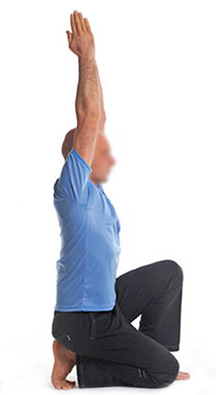
Posture:Vira–asana–The Hero Pose
Translation:The Sanskrit word vira means hero, brave or eminent man, or warrior.
Pronunciation:veer-ah-sa-na
Difficulty:(2)
Instructions:
- Kneel on the floor with the calves and tops of the feet flat on the floor and the thighs touching.
- Slowly spread the feet, about shoulder distance apart, while keeping the knees together. Place the buttocks flat on the floor. The outer sides of the thighs are touching the inner sides of the calves and the soles of the feet are exposed facing up. Place the hands palms downs, on the knees and form a circle with the thumb and forefinger (in the chin-mudra) while pointing the other fingers straight ahead.
- Breath slowly and deeply through the nostrils and remain motionless for six complete breaths (an inhale and exhale is one complete breath).
- Inhale slowly and stretch the arms straight up over the head and interlock the fingers with the palms pushed upward. Remain in this position for six complete breaths.
- Exhale slowly, release the fingers and slowly bend forward at the waist while placing the palms of the hands flat on the soles of the feet. Place the chin between the knees.
- Hold this position for the duration of six complete breaths.Inhale, raise the chest up, stretch the legs straight ahead and place the hands, palms down, on top of the thighs.
Comments:
The vira-asana is an alternative to the padma-asana,siddha-asana, as well as other seated postures, for mediation and pranayama.
Duration/Repetitions:
Hold the posture from several minutes as part of an asana session or for the duration of your meditation or pranyama.
Variations:
The Supta-vira-asana variation (supta is the Sanskrit word for "lying down") stretches the abdominal muscles and relieves pain and discomfort in the legs. Begin the posture as detailed above then incline backwards and lean the back on the floor. The arms are stretch straight above the shoulders and kept flat on the floor.


